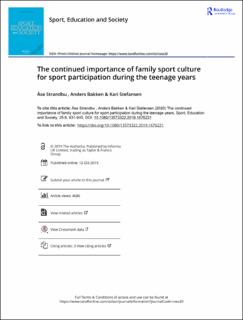The continued importance of family sport culture for sport participation during the teenage years
Peer reviewed, Journal article
Published version
Permanent lenke
https://hdl.handle.net/11250/2733135Utgivelsesdato
2019Metadata
Vis full innførselSamlinger
- Artikler / Articles [2096]
- Publikasjoner fra Cristin [1084]
Sammendrag
Growing up in a family with an affinity for sports increases the likelihood of participating in club-organised sports. Few studies to date have addressed whether the importance of family sport culture is stable or changes during the teenage years. This article examines the association between family sport culture and participation in club-organised sports during teenage years and whether it differs between boys and girls. We utilise data from Norway and the comprehensive ‘Young in Oslo 2015’ survey (N = 6121; 79% response rate; ages 13–18). Three questions were combined into a measure of family sport culture in the present study: the importance of sport in the family, parents’ training habits, and whether parents would like their children to participate in sports. We observed a clear positive relationship between family sport culture and participation in club-organised sports. Except for a slightly weakened relationship with age among girls, the relationship was equally strong in all age groups. We suggest that the overall continuity in the relevance of family sport culture for young people’s sport participation reflects a prolonged socialisation effect that we utilise Bourdieu’s theory of habitus to understand.
Beskrivelse
This is an Open Access article distributed under the terms of the Creative Commons Attribution-NonCommercial-NoDerivatives License (http://creativecommons.org/licenses/by-nc-nd/4.0/), which permits non-commercial re-use, distribution, and reproduction in any medium, provided the original work is properly cited, and is not altered, transformed, or built upon in any way.
